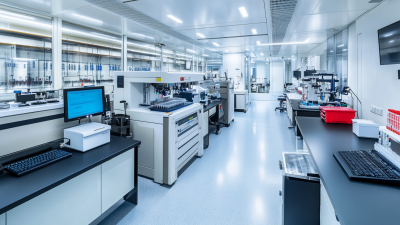

5 Compelling Reasons Home Laboratories Are Revolutionizing Global Research and Development
In recent years, the rise of the "Home Laboratory" has sparked a transformation in global research and development, driven by advancements in technology and a growing trend towards accessibility in science. According to a report by Research and Markets, the global DIY biotechnology market is expected to reach $3.24 billion by 2025, reflecting a significant shift towards personalized research practices. This evolution empowers individuals, hobbyists, and small enterprises to conduct experiments that were once limited to traditional laboratory settings.

The democratization of scientific inquiry not only fosters innovation but also accelerates the pace of discovery across various fields, from biotechnology to environmental science. As a consequence, home laboratories are emerging as vital contributors to the collective effort in tackling prominent global challenges, paving the way for breakthroughs that can enhance health, sustainability, and technology in ways previously unimaginable.
The Rise of Home Laboratories: A New Era in Research and Development
The rise of home laboratories represents a significant shift in the landscape of research and development. No longer confined to large institutions or commercial enterprises, innovative thinkers are increasingly conducting experiments in their own spaces. According to a recent report by Research and Markets, the global DIY biology market is projected to grow at a CAGR of 23% from 2021 to 2026, highlighting the burgeoning interest in accessible science. This democratization of research empowers individuals and small teams to explore new ideas, fostering creativity and innovation outside traditional boundaries.

As home laboratories flourish, there are key tips for aspiring home scientists. Firstly, ensure that your workspace adheres to safety regulations. Proper ventilation, protective gear, and waste disposal are critical to maintaining a safe environment. Secondly, leverage online platforms and communities. Websites like DIYbio and social media groups provide valuable resources, networking opportunities, and support for those embarking on their scientific journey.
Furthermore, consider starting small. Engaging in less complex experiments can build confidence and skills in handling various equipment and methodologies. With the right approach, home laboratories can serve as incubators for groundbreaking discoveries, driving the evolution of R&D worldwide.
Empowering Citizen Scientists: How Home Labs Foster Innovation
The rise of home laboratories is ushering in a new era of citizen science, enabling individuals to engage directly in research and development. According to a recent report from the National Academies of Sciences, Engineering, and Medicine, community-based research initiatives have increased by over 40% in the last decade, reflecting a growing trend among non-professionals to contribute meaningfully to scientific discoveries. By democratizing access to scientific tools and knowledge, home labs empower everyday citizens to explore their interests and address local challenges in innovative ways.
Tips for setting up an effective home laboratory include starting with a clear research question, which can help focus your efforts and resources. Additionally, consider leveraging online platforms and social media to connect with like-minded individuals and organizations; this collaborative spirit can enhance the scope and impact of your projects. Furthermore, maintaining a detailed lab journal will not only streamline your research process but also contribute to the larger scientific community by sharing valuable findings with others.
By harnessing the collective intelligence of citizen scientists, home laboratories are breaking down barriers in R&D. As evidenced by a 2022 survey indicating that 57% of respondents believe amateur science can lead to real-world solutions, the importance of fostering innovation at home cannot be overstated. Embracing this movement not only enriches personal knowledge but also contributes to global scientific advancements.
Cost-Effectiveness of Home Laboratories: Driving Accessible Research
The emergence of home laboratories is transforming the landscape of research and development, primarily through their cost-effectiveness. Traditional laboratory setups often require significant investments in equipment, space, and maintenance, which can be prohibitive for many budding researchers and innovators. Home laboratories, however, provide an accessible alternative, allowing passionate individuals to conduct experiments and develop solutions without the burden of extensive overhead costs. This shift not only fosters innovation at a grassroots level but also democratizes research, making it possible for diverse voices to contribute to scientific progress.
**Tip:** To maximize the effectiveness of your home lab, consider starting small. Focus on essential tools and equipment that are versatile and can accommodate a variety of experiments. This approach not only keeps initial expenses low but also provides the flexibility to pivot your research focus as new ideas develop.
Additionally, collaborating with a community of like-minded researchers can amplify your efforts. Online forums and local meetups are excellent resources to share knowledge, troubleshoot challenges, and even pool resources for more complex projects.
**Tip:** Leverage open-source platforms for experimenting with research designs and protocols. These resources often provide invaluable insights and can lead to innovative solutions without the financial strain of proprietary systems.
Cost-Effectiveness of Home Laboratories: Driving Accessible Research
Breaking Down Barriers: Home Labs' Role in Global Collaboration
The rise of home laboratories has dramatically transformed the landscape of global research and development. By breaking down traditional barriers to collaboration, these intimate and accessible spaces allow individuals and small teams to contribute to scientific advancements from virtually anywhere in the world. Unlike conventional labs that are often limited by institutional resources and geographic constraints, home labs empower aspiring scientists and hobbyists alike to engage in meaningful research. This democratization of science fosters diverse perspectives and innovative approaches, enriching the overall body of knowledge.
Moreover, the interconnectedness facilitated by digital platforms enables home lab practitioners to share findings, protocols, and techniques on a global scale. Communities form around shared interests, allowing for real-time collaboration and feedback. This synergy accelerates the pace of discovery as researchers from different backgrounds come together to tackle complex problems. As these grassroots movements gain momentum, the collective efforts can lead to significant breakthroughs that might have been overlooked in traditional research environments. The surge of creativity and innovation emerging from home laboratories is reshaping how we view scientific inquiry, making it more inclusive and accessible than ever before.
5 Compelling Reasons Home Laboratories Are Revolutionizing Global Research and Development
| Reason | Description | Impact | Example Fields |
|---|---|---|---|
| Accessibility | Home laboratories allow individuals to conduct experiments without the need for expensive lab facilities. | Increases participation in research. | Biotechnology, Material Science |
| Collaboration | Facilitates collaboration between international researchers, sharing tools and data seamlessly. | Enhances global knowledge exchange. | Chemistry, Environmental Science |
| Innovation | Encourages creativity and experimentation among amateur scientists. | Drives new product development. | Pharmaceuticals, Agritech |
| Cost-Effectiveness | Reduces the overall costs of conducting experiments, making R&D more affordable. | Broadens access to research opportunities. | Education, Social Science |
| Speed of Research | Allows for faster experimentation and quicker iteration of ideas. | Accelerates technological advancements. | Robotics, AI Development |
Sustainability and Ethics in Home-Based Research Practices
Home laboratories are not just changing the landscape of research and development; they are also paving the way for more sustainable and ethical practices. With the rise of home-based experimentation, researchers can minimize their carbon footprint by reducing the need for large-scale facilities. This decentralization allows for localized research projects that focus on community-specific problems, thus fostering a greater connection between science and society.

One way to enhance sustainability in home laboratories is to adopt renewable resources wherever possible. For instance, using solar-powered equipment and biodegradable materials can significantly cut down on environmental impact. Always consider sourcing your materials locally to reduce transportation emissions and support local economies.
Ethics in home-based research practices is equally crucial. Open communication with the community about research objectives and methods can build trust and transparency. Researchers should prioritize safety and compliance with ethical guidelines while ensuring that their work benefits not just themselves, but also their surroundings. By prioritizing these ethical considerations, home laboratories can contribute positively to societal growth and scientific integrity, creating a win-win scenario for researchers and the communities they serve.
Related Posts
-

Challenges in Selecting the Right Laboratory Equipment: Insights from Industry Trends
-

Innovative Solutions for Best Scientific Lab Equipment in Modern Research
-

How to Evaluate Quality When Buying Used Lab Equipment for Your Research Needs
-

Ultimate Guide to Sourcing Quality Equipment from the Best Lab Equipment Store
-

Unlocking Global Trade Opportunities with Lab Equipment at the 137th Canton Fair 2025
-

Understanding the Unique Features and Applications of the Best Used Scientific Equipment for Global Buyers





